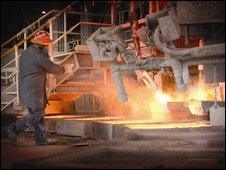Australia agrees deal to reduce new mining tax
- Published

Mining firms feared high taxes would push investment in mining abroad
The Australian government has reached a deal with mining companies over controversial tax plans.
Former Prime Minister Kevin Rudd had announced plans for a 40% tax on miners' profits.
But a compromise agreement negotiated by his successor, Julia Gillard, has now reduced the rate to 30% for coal and iron ore miners.
The deal was struck just a week after Ms Gillard had swept to office and the mining tax had become highly political.
Shares boost
Several of the mining giants had threatened to halt or cancel projects because of Mr Rudd's proposal, which they said seriously risked Australia's international competitiveness.
The agreement means such threats look set to be withdrawn.
Mining stocks in London were lifted by the news, with Xstrata up more than 3%, and Lonmin, BHP Billiton and Rio Tinto all rising about 1%.
Under the deal, petroleum and gas operations will still pay a pre-existing 40% tax rate, the government said.
That will now cover onshore oil and gas projects as well as the offshore operations previously subject to it.
Smaller iron ore and coal companies, with annual profits below 50m Australian dollars (£28m; $42m), will not be required to pay the new tax.
The plans are still expected to raise billions of dollars for the government.
"Rio Tinto, for instance, will be paying about A$20bn in tax over and above the current situation, but that's about A$10bn less than they would have paid [under the original proposals]," Charles Kernot, mining analyst at Evolution Beeson Gregory, told the BBC.
He said the new deal reduces the total tax burden on miners "from about 57% under the worst case scenario under the original proposal, to somewhere in the low 40s - about 42% or 43%."
TV row
When Mr Rudd announced the tax plans earlier this year, he said he expected to raise A$9bn a year.
The revised plan would raise A$1.5bn less, the government said, but cuts to company tax rates that were to be paid for by the mining tax will still go ahead.
The BBC's Nick Bryant in Sydney says the deal brings to an end one of the most angry battles between the government and corporate sector that Australia has seen.
The row played out on prime time television with confrontational advertisements from both sides, and played a key part in the demise of Mr Rudd, our correspondent says.
In a country often called the "quarry of the world", many Australians believe their personal prosperity is inextricably linked with the fortunes of the mining giants, he adds.
Companies including BHP Billiton and Rio Tinto had launched an aggressive lobbying campaign against Mr Rudd's tax plan, warning that it could harm economic growth.
But industry executives welcomed the fresh deal, calling it "a positive outcome".
Election due?
Ms Gillard said the "breakthrough agreement" would "deliver a better return for the Australian people for the resources they own and which can only be dug up once".
Many political observers suggest that, having stuck a deal, Ms Gillard's Labor Party - which has already seen a surge in the polls following her becoming leader last week - may call an election imminently to capitalise on its popularity.
Opposition parties have vowed to oppose the tax and scrap it if they win office.
Talks between Mr Rudd and the mining firms had stalled.
Australian political analyst Rob Chalmers said the miners realised that Ms Gillard had a much better chance of winning an election than Mr Rudd, which meant a fresh mining tax was probably inevitable.
"The miners were not going to negotiate a deal, as they were not going to do anything to help Rudd win the election. They wanted him to lose," Mr Chalmers said.
"He [Rudd] gets dumped and Julia comes in… so what do the miners do? They have to cut a deal with her, as she had the whip hand now."
- Published24 June 2010
- Published24 June 2010
- Published24 June 2010
- Published3 June 2010
- Published19 May 2010
- Published3 May 2010